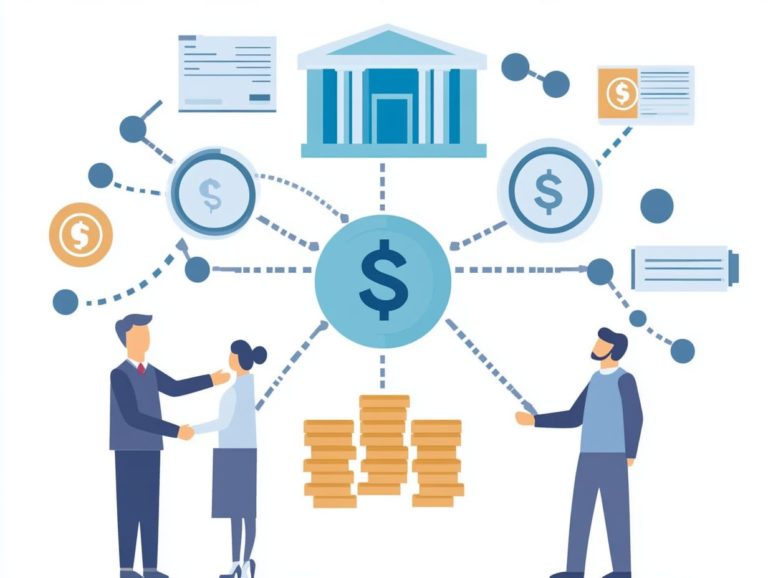Are Peer-to-Peer Loans Safe? What You Need to Know
Peer-to-peer (P2P) loans have emerged as a compelling alternative to traditional banking, providing you with a unique opportunity to connect directly with borrowers or lenders.
Understanding the potential benefits, risks, and safety considerations is crucial before diving in. This article delves into the intricacies of P2P loans, highlighting advantages such as lower interest rates and increased flexibility. It also addresses risks like scams and default rates.
You ll discover how to assess the safety of these loans and explore viable alternatives. Whether you’re contemplating a P2P loan or just curious about this evolving trend, the insights provided here will be invaluable.
Contents
- Key Takeaways:
- Understanding Peer-to-Peer Loans
- Benefits of Peer-to-Peer Loans
- Risks of P2P Loans
- How to Evaluate the Safety of P2P Loans
- Alternatives to P2P Loans
- Frequently Asked Questions
- 1. Are peer-to-peer loans safe?
- 2. What is a peer-to-peer loan?
- 3. What are the benefits of peer-to-peer loans?
- 4. What should I consider before applying for a peer-to-peer loan?
- 5. How is my personal information protected in a peer-to-peer loan?
- 6. What happens if a borrower defaults on a peer-to-peer loan?
- Frequently Asked Questions about Peer-to-Peer Loans
Key Takeaways:

Peer-to-peer loans offer lower interest rates and more flexibility compared to traditional loans, making them an attractive option for borrowers. However, there are risks involved, such as scams and default rates, so it’s essential to thoroughly evaluate the guide to peer-to-peer lending platforms for safety before investing. Check the platform’s history and how they protect borrowers. Explore other financing options to mitigate risk.
Understanding Peer-to-Peer Loans
Understanding Peer-to-Peer (P2P) loans means grasping their fundamental structure, which connects you directly with investors or lenders while bypassing middlemen like banks and credit unions.
You ll find these loans are managed online, making it easier than ever to get the funds you need! In recent years, platforms such as LendingClub and Prosper have transformed personal lending, simplifying the process for you to meet your borrowing needs while giving investors the chance for potentially higher returns.
As with any financial product, it’s essential to understand the loan terms and the associated risks for both sides.
What are Peer-to-Peer Loans?
Peer-to-Peer (P2P) loans offer a modern twist on personal financing by enabling direct lending between individuals through online platforms, all while skipping traditional financial institutions.
This innovative approach allows you to obtain funds for various needs, whether for a personal loan or debt consolidation, by connecting directly with individual investors.
Unlike conventional bank loans, which often come with lengthy approval processes and strict eligibility requirements, applying for a P2P loan is typically straightforward and done entirely online.
You can submit your loan requests through the platform, where your profile is assessed based on factors like credit scores key elements that significantly influence your loan eligibility and terms.
As you complete your profile, loan listings are generated, giving investors the chance to evaluate potential opportunities and choose whom to finance based on their unique risk assessment preferences.
Benefits of Peer-to-Peer Loans
The benefits of Peer-to-Peer (P2P) loans go well beyond simple convenience. You ll often find lower interest rates compared to traditional financial institutions and greater flexibility in loan terms, making them an appealing choice for many borrowers.
P2P lending platforms offer a range of loan options tailored to meet diverse needs, whether you’re looking for personal loans, funding for a business venture, or seeking to consolidate debt.
By connecting investors directly with borrowers, these platforms create opportunities for higher returns, crafting a win-win scenario for everyone involved.
Start exploring P2P loans today to discover your options!
Lower Interest Rates and More Flexibility
P2P loans often offer lower interest rates than traditional banks. This makes them an appealing choice for many borrowers.
P2P platforms evaluate creditworthiness using various data points beyond your credit score. They look at your spending habits and income sources to get a fuller picture of your financial health.
These platforms present a range of loan options from short-term personal loans to long-term home improvement financing with flexible repayment terms tailored to your needs.
The streamlined online application process allows you to receive immediate feedback on your eligibility. This creates a more accessible environment for those seeking financial support, free from the lengthy procedures typical of traditional lending institutions.
Risks of P2P Loans
P2P loans come with their own set of risks, including potential scams and default rates that can deeply affect both borrowers and investors.
Understanding these risks is crucial for making informed decisions in today s dynamic financial landscape. While P2P lending platforms carefully evaluate risks, it s also important to select trustworthy platforms that prioritize transparency and security.
Your choices in this arena can significantly influence your financial outcomes.
Potential Scams and Default Rates

In the world of P2P lending, you must stay vigilant regarding potential scams and default rates. These challenges can significantly impact both borrowers and investors.
Issues may arise in various forms, such as fraudulent loan offers or fabricated borrower profiles, leading to unwelcome financial losses. To navigate this landscape effectively, conducting thorough research is essential.
This means verifying the credibility of the lending platform, checking user reviews, and ensuring regulatory compliance. Understanding default rates is crucial for assessing investment risks and returns, as these figures reveal the likelihood of borrowers defaulting on their loans.
By evaluating these factors, you empower yourself to make informed decisions and highlight the importance of comprehensive risk assessment in protecting your investments.
How to Evaluate the Safety of P2P Loans
Evaluating the safety of P2P loans is essential, whether you’re a borrower or an investor. It requires careful assessment of platform reliability and a clear understanding of the risks involved, which is why reviewing this beginner’s guide to peer-to-peer lending can be invaluable.
Factors to Consider
When exploring P2P loans, consider several key factors, including common questions on peer-to-peer lending risks, to ensure a safe and advantageous borrowing experience.
Your credit score is paramount; it directly impacts the loan amount you can secure and the interest rate offered. A higher credit score often means more favorable loan terms, lowering your overall borrowing costs.
It s important to check the reputation of the lending platform. Reputable platforms typically implement stringent vetting processes that enhance security for both borrowers and investors, fostering greater trust in the transaction.
By evaluating these elements, you can navigate the P2P lending landscape with confidence, paving the way for a positive financial outcome.
Alternatives to P2P Loans
Alternatives to P2P loans present a range of financing options tailored to various borrowing needs.
Consider personal loans, home equity loans, or even business loans, all of which are available through credit unions and online lenders.
Each option is designed to suit your specific financial requirements, providing you with the flexibility to choose what works best for you.
Other Types of Loans and Financing Options
When considering Peer-to-Peer (P2P) loans, you have many financing options available. Explore personal loans, home equity loans, business loans, and debt consolidation, each designed for specific financial needs.
Personal loans offer flexibility for various expenses with competitive interest rates. If you’re a homeowner, home equity loans let you use your property s value for renovations or paying off debts.
For entrepreneurs, business loans help launch or expand ventures. Debt consolidation loans combine multiple payments into a single, manageable one.
Don t overlook credit unions and online lenders. They often provide lower rates and a personalized experience compared to traditional banks.
Evaluate your financial goals carefully to find the option that fits your needs best.
Frequently Asked Questions
1. Are peer-to-peer loans safe?
Yes, peer-to-peer loans can be safe if you take the right precautions. Like any lending or investing, there are risks involved, but you can reduce them by researching and choosing a reputable platform. To better understand these risks, refer to the risks of peer-to-peer lending and what to avoid.
2. What is a peer-to-peer loan?
A peer-to-peer loan is when individuals or investors lend money to borrowers without using traditional banks. These loans happen through online platforms, offering a more direct and often cheaper borrowing experience.
3. What are the benefits of peer-to-peer loans?
Peer-to-peer loans can offer lower interest rates and more flexible terms than traditional loans. They also provide an alternative for those who may not qualify for a bank loan or prefer a personal touch.
4. What should I consider before applying for a peer-to-peer loan?
Evaluate your financial situation to see if a peer-to-peer loan is right for you. Research the platform, understand the fees and interest rates, and have a solid repayment plan ready.
5. How is my personal information protected in a peer-to-peer loan?
Peer-to-peer lending platforms use advanced security measures to safeguard your information. They follow strict privacy policies to ensure your data isn t shared with third parties without your consent.
6. What happens if a borrower defaults on a peer-to-peer loan?
This section requires additional content on the implications and possible actions taken when a borrower defaults on a loan.
Frequently Asked Questions about Peer-to-Peer Loans
1. Are peer-to-peer loans safe?
Yes, peer-to-peer loans can be safe if you take the right precautions. While there are risks involved, like with any other form of lending or investing, you can minimize them by doing thorough research and navigating risks in peer-to-peer lending by choosing a reputable platform.
2. What is a peer-to-peer loan?
A peer-to-peer loan is when individuals lend money directly to other individuals without a bank. These loans are facilitated through online platforms, offering a more direct and potentially lower-cost borrowing experience.
3. What are the benefits of peer-to-peer loans?
Peer-to-peer loans often come with lower interest rates compared to traditional loans and more flexible terms. They also provide an alternative source of funding for borrowers who may not qualify for a bank loan or prefer a more personal lending experience.
4. What should I consider before applying for a peer-to-peer loan?
Before applying, evaluate your financial situation to determine if this option is right for you. Research your chosen platform, understand the fees and interest rates, and ensure you have a solid repayment plan in place.
5. How is my personal information protected in a peer-to-peer loan?
Peer-to-peer lending platforms use advanced security measures to safeguard your personal and financial information. They also have strict data privacy policies, ensuring your information is not shared with any third parties without your consent.
6. What happens if a borrower defaults on a peer-to-peer loan?
If a borrower defaults, the platform typically has a collection process to recover the funds. However, you might lose your investment, so it’s crucial to carefully consider the level of risk you are willing to take on before lending through a peer-to-peer platform.








